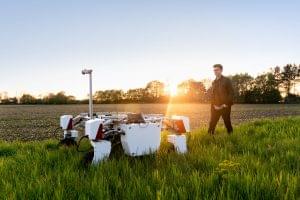The future of successful agriculture is digitization and robotization
The future of successful agriculture is digitization and robotization, and the use of precision tools, as this can significantly influence its efficiency already at sowing, as well as the dynamics of herd development later – the latest study of the Climate Policy Institute points out.

Robotization will provide real help to farmers in the future. (Photo: Pixabay)
In the analysis published on Friday, it was indicated that it is necessary to prepare for the extremes of the next decades, because climate change and weather extremes will determine the next decade in the agricultural sector in Hungary as well. It is necessary to simultaneously prepare for heat stress, drought, increased rainfall intensity and extremes caused by thunderstorms during the growing season, especially in summer. He points out: both in the short and long term, irrigation alone is not a sufficient solution to drought and drought damage. The only way to prepare for the extremes of weather and climate change is if the domestic agricultural sector deploys several alternative techniques and technologies at the same time, and central decision-making, in cooperation with experts, research centers, and farmers, tries to find solutions and provide assistance on a regional and local level.
I would increase the size of the irrigated areas, up to three times
In the near future, the institute considers it important to take advantage of the fact that Hungary has a unique plant gene bank (National Center for Biodiversity and Gene Conservation, Tápiószele) and can continuously breed and develop seeds adapted to the changing climate and weather. They noted: however, variety selection alone is only a partial success, it is necessary to transform the entire technological system, from tillage to intelligent farming to plant protection. Because the soil is the key to everything, if it can hold water, then the plants can survive periods of lack of rainfall with less damage. They pointed out that 4.3-4.4 million hectares are currently under cultivation in our country, of which just over 2 percent, roughly 100,000 hectares, are irrigated. The most ambitious plans would increase the ratio to two or three times, which means 200-300 thousand hectares, more than that could not realistically be involved. According to the analysis, a solution must be found as soon as possible for the targeted surface and underground water storage, the utilization of the stocks for agricultural and drinking water supply purposes with new technological solutions. Another solution is the storage of falling precipitation (rain reservoirs). Different forms of surface water retention are the most effective means of protection against the negative effects of climate change. In addition to irrigation, the creation of a water retention concept can be the right solution for mitigating drought damage.
This is how arable farming could be relocated in Hungary
According to the researchers, a solution could also be to move field cultivation from arid regions to less arid regions, for example, from the Great Plain to the Lesser Region or the plains of Transdanubia. The re-introduction of less productive but more stress-tolerant varieties with a short growing season, such as certain soybean varieties or spelled wheat, could be a renaissance for our current crops. This year’s and last year’s drought may accelerate the decline of corn in Hungary, today at least 300-400 thousand hectares cannot be produced effectively. The area, which currently accounts for 6-8 percent of the arable land and is increasingly unsuitable for corn cultivation, is expected to grow rapidly in the coming years as climate change progresses, the analysis concluded.
MTI
Related news
Avian influenza has appeared in a new farm in Csongrád-Csanád County
🎧 Hallgasd a cikket: Lejátszás Szünet Folytatás Leállítás Nyelv: Auto…
Read more >UBM may continue its international expansion
🎧 Hallgasd a cikket: Lejátszás Szünet Folytatás Leállítás Nyelv: Auto…
Read more >Related news
Festival buzz at the 60th anniversary EuroShop trade fair
🎧 Hallgasd a cikket: Lejátszás Szünet Folytatás Leállítás Nyelv: Auto…
Read more >Historic price reduction at ALDI
🎧 Hallgasd a cikket: Lejátszás Szünet Folytatás Leállítás Nyelv: Auto…
Read more >A stable compass in the Hungarian FMCG sector for 20 years
🎧 Hallgasd a cikket: Lejátszás Szünet Folytatás Leállítás Nyelv: Auto…
Read more >








